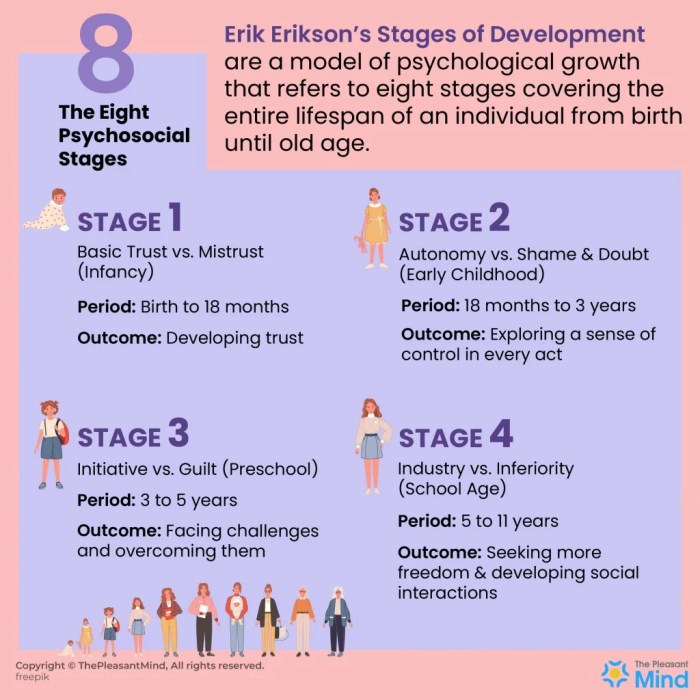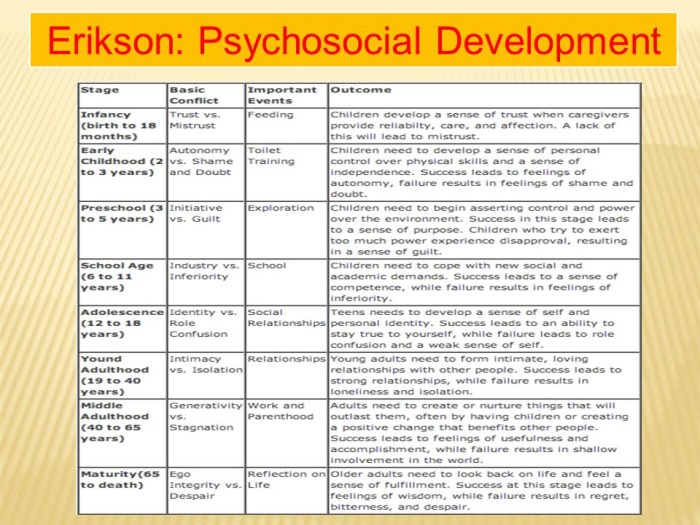Embark on an insightful journey with the Erikson Stages of Development Quiz, a comprehensive assessment tool designed to illuminate your understanding of Erikson’s groundbreaking theory of psychosocial development. This engaging quiz delves into the intricacies of each stage, exploring the central conflicts and resolutions that shape human growth and identity.
Through a series of carefully crafted questions, you will navigate the eight stages of Erikson’s theory, gaining a deeper appreciation for the challenges and opportunities that accompany each developmental milestone. Whether you are an educator, clinician, or individual seeking personal growth, this quiz empowers you to assess your understanding of Erikson’s seminal work and identify areas for further exploration.
Erikson’s Stages of Development: Overview

Erikson’s theory of psychosocial development proposes that individuals progress through a series of eight stages throughout their lifespan, each characterized by a central conflict that must be resolved to achieve psychological well-being.
Key Principles
- Development occurs in a series of stages, each with a unique conflict and resolution.
- Conflicts are psychosocial in nature, involving both social and emotional aspects.
- Successful resolution of conflicts leads to healthy personality development, while unsuccessful resolution can result in maladjustment.
Summary of Stages
| Stage | Age Range | Conflict | Resolution |
|---|---|---|---|
| Infancy | Birth to 1 year | Trust vs. Mistrust | Developing a sense of trust in caregivers and the world |
| Early Childhood | 1 to 3 years | Autonomy vs. Shame and Doubt | Developing a sense of independence and self-control |
| Play Age | 3 to 6 years | Initiative vs. Guilt | Developing a sense of purpose and direction |
| School Age | 6 to 12 years | Industry vs. Inferiority | Developing a sense of competence and accomplishment |
| Adolescence | 12 to 18 years | Identity vs. Role Confusion | Developing a sense of self and purpose in life |
| Young Adulthood | 18 to 25 years | Intimacy vs. Isolation | Developing close and meaningful relationships |
| Adulthood | 25 to 65 years | Generativity vs. Stagnation | Contributing to society and raising the next generation |
| Maturity | 65 years and up | Integrity vs. Despair | Reflecting on one’s life and accepting it with a sense of purpose and fulfillment |
Creating an Erikson Stages of Development Quiz

Purpose and Benefits
- Assess understanding of Erikson’s theory
- Identify areas of strength and weakness in understanding
- Provide a tool for self-reflection and growth
Key Elements of Questions
- Age range
- Scenario describing a conflict or situation
- Response options that reflect the different resolutions of the conflict
Structuring Questions
- Clearly state the conflict being addressed.
- Provide a realistic scenario that illustrates the conflict.
- Include response options that cover the key resolutions of the conflict.
- Ensure questions are age-appropriate and relevant to the target audience.
Using HTML Table Tags to Display Quiz Results
Benefits of HTML Tables
- Organize results in a clear and structured manner
- Facilitate easy reading and interpretation
- Enable quick identification of patterns and trends
Creating an HTML Table
Use the following HTML code to create a simple table:
“`html
| Question | Response |
|---|---|
| 1 | Trust vs. Mistrust |
| 2 | Autonomy vs. Shame and Doubt |
“`
Styling the Table
Use CSS to enhance the appearance of the table, such as:
“`csstable border-collapse: collapse;th, td padding: 5px;“`
Scoring and Interpreting Quiz Results
Scoring
- Assign points for each correct response.
- Consider both individual responses and overall patterns.
Interpretation
- Identify areas where participants demonstrate a strong understanding of the theory.
- Pinpoint areas where misconceptions or gaps in knowledge exist.
- Use the results to inform further learning and support for individuals at different developmental stages.
Sample Erikson Stages of Development Quiz Questions

Multiple Choice
Which of the following is the central conflict of Erikson’s first stage of development?
- Trust vs. Mistrust
- Autonomy vs. Shame and Doubt
- Initiative vs. Guilt
True/False
Erikson’s theory suggests that individuals progress through the stages of development in a fixed order.
- True
- False
Short Answer, Erikson stages of development quiz
Describe the resolution of the conflict in Erikson’s fourth stage of development, Industry vs. Inferiority.
Extensions and Applications
Extensions
- Add more questions to cover a wider range of scenarios.
- Incorporate different types of questions, such as open-ended or essay questions.
Applications
- Educational settings to assess student understanding of developmental psychology.
- Clinical practice to identify areas of concern and inform treatment planning.
- Personal development to promote self-reflection and growth.
Frequently Asked Questions: Erikson Stages Of Development Quiz
What is the purpose of the Erikson Stages of Development Quiz?
The Erikson Stages of Development Quiz is designed to assess your understanding of Erikson’s theory of psychosocial development and identify areas where further exploration may be beneficial.
How many stages are included in the quiz?
The quiz covers all eight stages of Erikson’s theory: Trust vs. Mistrust, Autonomy vs. Shame and Doubt, Initiative vs. Guilt, Industry vs. Inferiority, Identity vs.
Role Confusion, Intimacy vs. Isolation, Generativity vs. Stagnation, and Integrity vs. Despair.
What types of questions are included in the quiz?
The quiz includes a mix of multiple-choice, true/false, and short answer questions to assess your understanding of the key concepts and principles of Erikson’s theory.